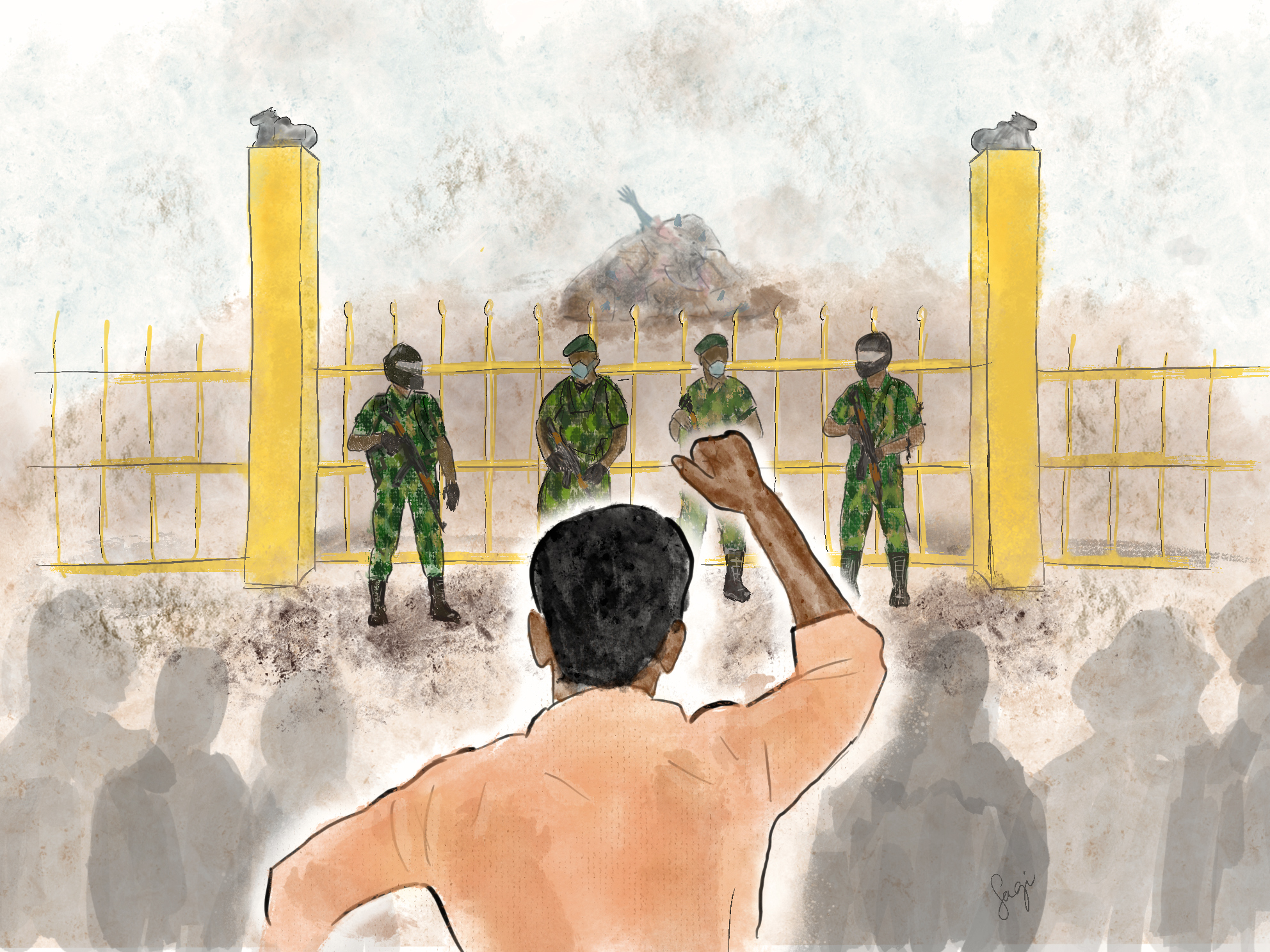Art by Sagi Thilipkumar
10 January 2021
A new wave of protest has erupted in the Tamil homeland as a monument dedicated to the tens of thousands massacred in Mullivaikkal was razed from the Jaffna University campus under the cover of night. Students and locals gathered outside the campus gates while Sri Lankan Special Task Force (STF) troops stood guard, blocking their entry and allowing the destruction to take place unhindered.
Although many have been left reeling from the sheer cruelty of the destruction, this act is not one without precedent. In 2017, a priest and the community he served in Mullivaikkal were harassed exorbitantly by Sri Lankan police for a memorial campaign in which the names of genocide victims were carved into stones. Jaffna University itself was affected in the wholesale destruction of monuments to the Tamil liberation struggle, with the initial destruction of its own Maaveerar memorial, and constant obstruction of other memorial events. Dozens of LTTE cemeteries, which housed the graves of thousands of cadres, remain as mounds of rubble or have been paved over entirely. Since the advent of the ‘victor’s peace’ in 2009, Sinhala triumphalism has dictated who can be remembered, and how. While Tamil memorialisation, public or private, to combatants and civilians alike, has been criminalised, Sinhala war victory monuments dominate the landscape of the North-East, an ever-present reminder to Tamils of their trauma and oppression. There is not one government-constructed memorial to Tamil civilians on the island. Attempts to attribute the current destruction to a bureaucratic dispute, that it was built without permission, ring hollow when compared to the erection of Buddhist shrines and military structures in the Tamil homeland, with no consideration for legality, due process, or permits from locally elected authorities.
While the university’s Vice Chancellor has faced the brunt of the outrage for the destruction, the decision has undoubtedly come about in the face of pressure from the highest levels of government and the Sri Lankan military, as he has since admitted. The history of the University of Jaffna at the heart of the Tamil resistance has made it a target of Sri Lankan state violence for decades. Even after the end of the armed struggle, students and staff continued to face assaults and violent threats for defying the military crackdowns that were intrinsic to the Rajapaksa reign of terror. The current attacks on civic space on campus however are part of a chain of events set off under the aegis of the ‘good-governance’ apostles of the Sirisena-Wickremesinghe regime. The summary dismissal of the former Vice Chancellor, and the banning of the former Head of Law from private practice - linked unequivocally to his appearing on cases of state enforced disappearances - all occurred under the former regime at the instigation of the Sri Lankan army.
The Sri Lankan military’s ability to interfere, unchallenged, in university affairs illustrates the authoritarianism that permeates the whole island, and which poses a particular menace to Tamils and Muslims. The global pandemic has provided a breeding ground for the proliferation of Gotabaya Rajapaksa’s chauvinistic policies. While Tamil political leaders have made admirable efforts to unite against the despotic acts of this government, the appalling spectacle of Sri Lankan police berating Tamil elected officials outside the campus, serves as a reminder of the historic futility of engagement with Sri Lanka’s ethnocracy, from the Bandaranaike-Chelvanayakam pact to the Tamil National Alliance’s recent collaboration with the United National Party. Calls for Tamil-speaking unity from Muslim leaders, themselves balking under the state’s renewed wave of oppression in the form of forced cremations, embody the solidarity that is vital for the survival of both peoples on the island. To withstand Sri Lanka's tyranny demands resistance, not compliance.
As the impassioned scenes outside the University of Jaffna highlight, for Tamils, patience is running out, but resistance has not waned. As calls for international accountability, including demands for Sri Lanka to face genocide charges at The Hague, mount, the Tamil nation has been clear in its rejection of empty gestures towards accountability. However the international community’s continued engagement with Sri Lanka flies in the face of these demands for reckoning and rights. That such destruction could occur just days after the visit of India’s foreign minister, highlights the futility of appeasing this regime. The image of Scottish-trained Sri Lankan STF troops patrolling the protest and keeping the students out of the campus perfectly encapsulates the failure of friendly international engagement, especially in the form of training and funding security sector reform. This same unit was heavily involved in cracking down on even private Maaveerar Naal remembrances last November. As the construction of the Mullivaikkal memorial intended to illustrate, but perhaps is better demonstrated by the cruelty of its destruction, the Sri Lankan state and its military, with the blood of hundreds of thousands of Tamils on their hands, are beyond reform.



No comments:
Post a Comment
Note: only a member of this blog may post a comment.